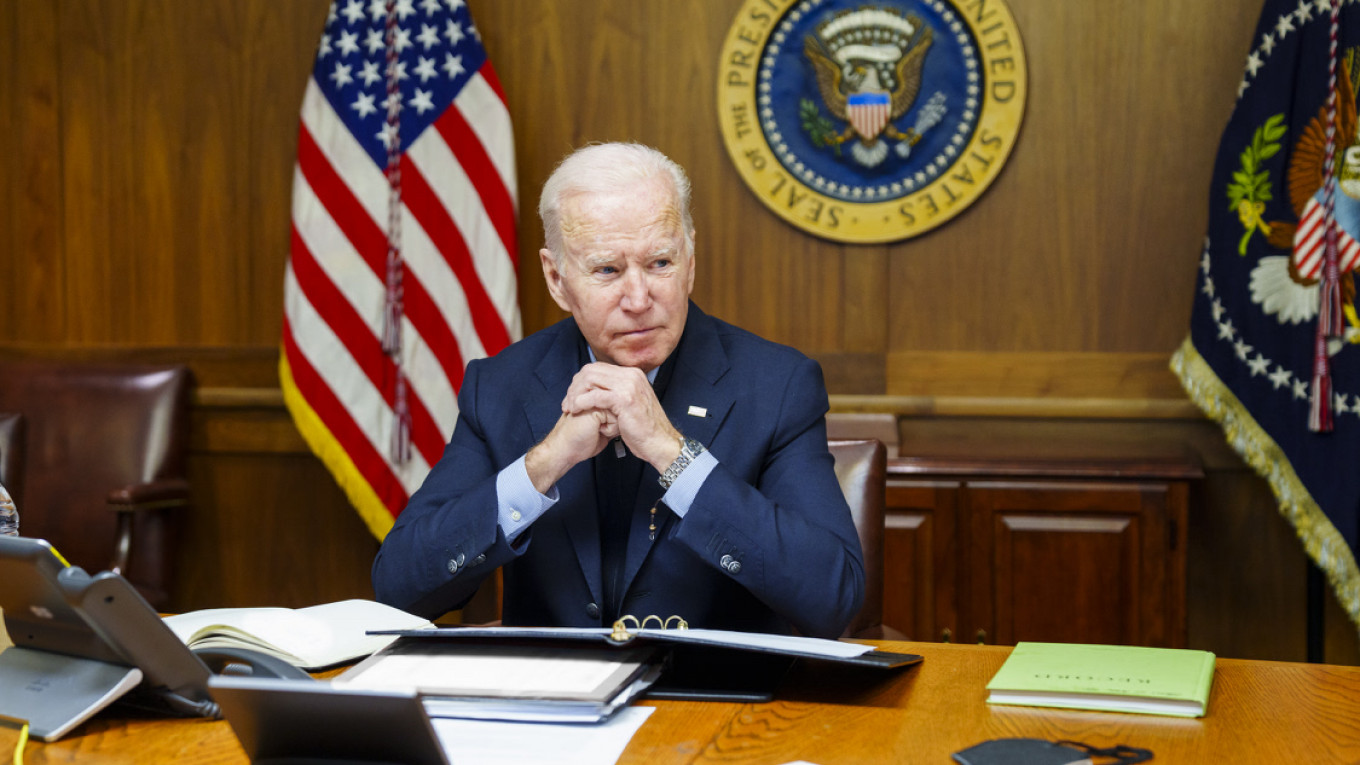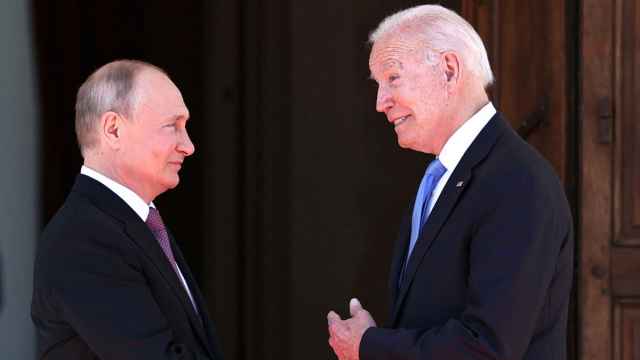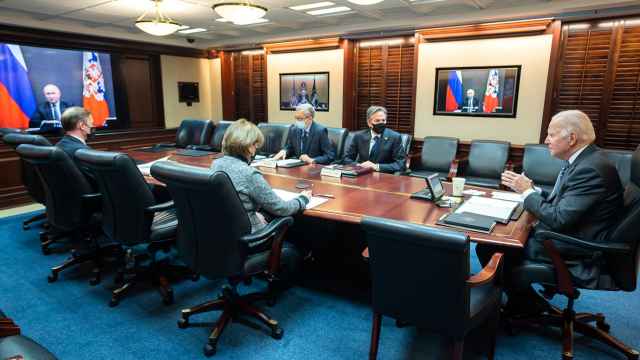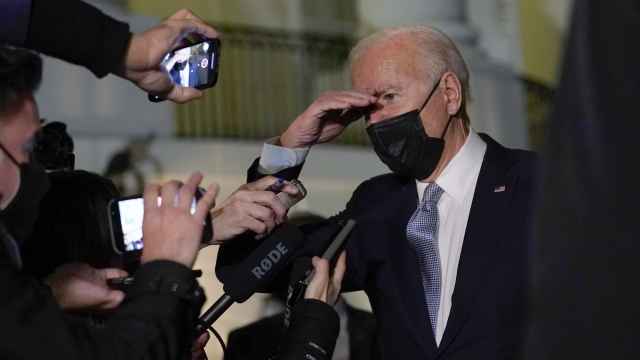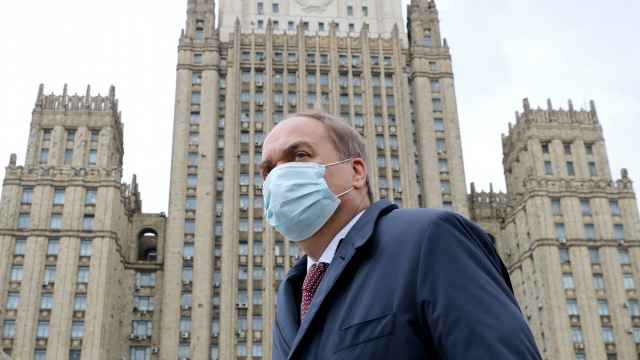Efforts to defuse the crisis in Ukraine via a frenzy of telephone diplomacy failed to ease tensions Saturday, with US President Joe Biden warning that Russia faces "swift and severe costs" if its troops carry out an invasion.
Russian leader Vladimir Putin slammed Western claims that Moscow was planning such a move as "provocative speculation" that could lead to conflict in the ex-Soviet country, according to a Russian readout of a call with French President Emmanuel Macron.
Speaking after new phone talks between Putin and Biden, the Kremlin's top foreign policy advisor Yury Ushakov told a conference call: "Hysteria has reached its peak."
Weeks of tensions that have seen Russia nearly surround its western neighbor with more than 100,000 troops intensified after Washington warned that an all-out invasion could begin "any day" and Russia launched its biggest naval drills in years across the Black Sea.
"If Russia undertakes a further invasion of Ukraine, the United States together with our allies and partners will respond decisively and impose swift and severe costs on Russia," Biden told Putin, according to the White House.
While the United States was prepared to engage in diplomacy, "we are equally prepared for other scenarios," Biden said, as the two nations stare down one of the gravest crises in East-West relations since the Cold War.
While the Biden-Putin talks were "professional and substantive," lasting just over an hour, they produced "no fundamental change" in dynamics, a senior US official told reporters.
Secretary of State Antony Blinken reiterated a US warning that Russia could stage a "false flag" incident to invade.
"No one should be surprised if Russia instigates a provocation or incident, which it then uses to justify military action it had planned all along," said Blinken, who spoke with his Russian counterpart Sergei Lavrov on Saturday.
Russia's defense ministry added to the febrile atmosphere by announcing that it had chased off a US submarine it said had crossed into its territorial waters near the Kuril Islands in the northern Pacific.
But the US Indo-Pacific Command denied it had been operating in Russian territorial waters.
Putin began his afternoon holding talks with Macron that lasted almost two hours.
Macron's office said "both expressed a desire to continue dialogue" but, like Washington, reported no clear progress.
'Possible provocations'
Russia added to the ominous tone by pulling some of its diplomatic staff out of Ukraine Saturday, with the foreign ministry saying its decision was prompted by fears of "possible provocations from the Kyiv regime."
But Washington and a host of European countries along with Israel cited the growing threat of a Russian invasion as they called on their citizens to leave Ukraine as soon possible.
Britain and the United States also pulled out the majority of their remaining military advisors, while the US embassy ordered "most" of its Kyiv staff to leave.
Australia said it had directed all remaining embassy staff in Kyiv to evacuate, and Canada said it was closing its embassy temporarily and moving operations to the western city of Lviv.
Dutch carrier KLM announced that it was suspending commercial flights to Ukraine until further notice.
The prospect of fleeing Westerners prompted Kyiv to issue an appeal to its citizens to "remain calm."
"Right now, the people's biggest enemy is panic," Ukrainian President Volodymyr Zelensky said on a visit to troops stationed near the Russian-annexed peninsula of Crimea.
'Any day now'
Washington on Friday issued its most dire warning yet that Russia had assembled enough forces to launch a serious assault.
"Our view that military action could occur any day now, and could occur before the end of the Olympics, is only growing in terms of its robustness," US National Security Advisor Jake Sullivan warned.
Sullivan stopped short on Friday of saying that the United States has concluded that Putin has made the decision to attack.
But some US and German media cited intelligence sources and officials as saying that a war could begin at some point after Putin concludes talks with German Chancellor Olaf Scholz in Moscow on Tuesday.
The German leader is due to travel to Kyiv on Monday and then visit Putin, as Europe strives to keep lines of communication open with Moscow.
Ukrainian leaders have been trying to talk down the prospects of an all-out war because of the damaging effect such fears are having on the country's teetering economy and public morale.
But the mood across the country remained tense.
The mayor's office in Kyiv said it had prepared an emergency evacuation plan for the capital's three million residents as a precaution.
Russia is seeking binding security guarantees from the West that include a pledge to roll NATO forces out of eastern Europe and to never expand into Ukraine.
Washington has flatly rejected the demands, but offered talks on a new European disarmament agreement with Moscow.
Blinken said Russia was preparing a response to the US proposals of "concrete areas for discussion."
"It remains to be seen if they'll follow through on that but if they do, we'll be ready to engage together with our allies and partners."
A Message from The Moscow Times:
Dear readers,
We are facing unprecedented challenges. Russia's Prosecutor General's Office has designated The Moscow Times as an "undesirable" organization, criminalizing our work and putting our staff at risk of prosecution. This follows our earlier unjust labeling as a "foreign agent."
These actions are direct attempts to silence independent journalism in Russia. The authorities claim our work "discredits the decisions of the Russian leadership." We see things differently: we strive to provide accurate, unbiased reporting on Russia.
We, the journalists of The Moscow Times, refuse to be silenced. But to continue our work, we need your help.
Your support, no matter how small, makes a world of difference. If you can, please support us monthly starting from just $2. It's quick to set up, and every contribution makes a significant impact.
By supporting The Moscow Times, you're defending open, independent journalism in the face of repression. Thank you for standing with us.
Remind me later.


